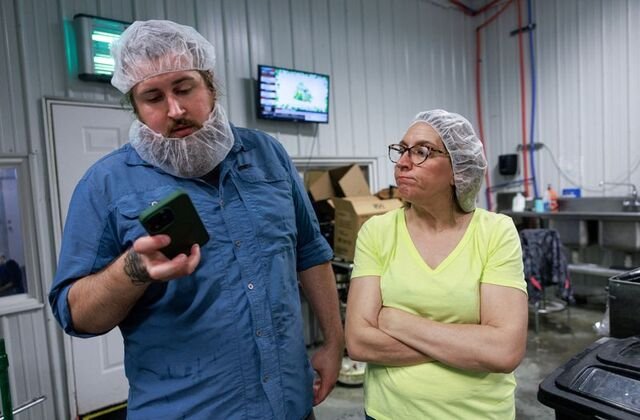
The Other Side of National Agriculture Day: Funding Cuts Aren’t Just Numbers
Rural Farmers Hit Hard by Agriculture Day Funding Cuts
This post explores the ripple effects of federal funding cuts on rural communities, particularly in the context of Donald Trump’s National Agriculture Day declaration, and the personal stories of those directly impacted.
As I sat in my kitchen, the sound of the butter churn took me back to my childhood. It was a comforting noise that wrapped around me like a warm blanket. But on this day, the call I received shattered that warm feeling. The Mountaineer Food Bank was ending its contract with local farmer Trey Yates due to federal funding cuts—news that felt like a slap in the face, especially so soon after President Trump celebrated National Agriculture Day. I couldn’t help but think, what about those of us who are left with empty plates?
The Stark Reality of Funding Cuts
Funding cuts can feel like a punch to the gut. They hit hard, especially in rural areas where communities depend on local resources. Recently, I learned about the devastating impact of these cuts on local farmers and food banks. It’s a stark reality that many of us might not fully grasp. But for those affected, it’s a daily struggle.
Loss of Essential Contracts for Local Farmers
One of the most significant casualties of funding cuts is the loss of contracts for local farmers. Take Trey Yates, for example. His butter contract with Mountaineer Food Bank was not just a business deal; it was a lifeline. When the funding was slashed, that lifeline was severed. Imagine waking up one day to find that your primary source of income has vanished. It’s not just about money; it’s about survival.
- Farmers rely on these contracts to sustain their livelihoods.
- Without them, many face financial ruin.
- The ripple effect extends to the entire community.
When farmers lose contracts, they can’t provide fresh produce and dairy to local food banks. This leads to a cycle of food insecurity that is hard to break. It’s a harsh reality that many families in rural areas are now facing.
Increased Food Insecurity in Rural Areas
Food insecurity is not just a statistic; it’s a reality for many families. In Rainelle, West Virginia, for instance, a staggering 20% decrease in food bank funding has left about 500 families affected. That’s not just numbers on a page; it’s real people struggling to put food on the table.
Think about it: how would you feel if you couldn’t guarantee your family a meal? The emotional toll of food insecurity is immense. Parents worry about how to feed their children. Kids go to school hungry, unable to focus on their studies. It’s a heartbreaking situation that no one should have to endure.
Diminished Support for Community Resources
As funding cuts continue, community resources dwindle. Food banks are often the first line of defense against hunger. They provide not just food, but also support and hope. As Trey Yates aptly put it,
‘Food banks are the backbone of our community.’
Without adequate funding, these essential services struggle to survive.
When community resources are diminished, the entire fabric of society begins to fray. Families lose access to vital services. Local charities can’t keep up with the demand. It’s a domino effect that can lead to widespread despair.
Statistics from Local Food Banks Post-Funding Cuts
Statistics tell a grim story. Food banks across the nation are reporting increased demand while facing reduced funding. In Rainelle, the situation is dire. The 20% decrease in funding has forced food banks to make tough choices. They can’t provide the same level of support they once did. This isn’t just a local issue; it’s a national crisis.
We need to ask ourselves: what can we do to help? How can we support our local farmers and food banks? Every little bit counts. Whether it’s donating food, volunteering time, or advocating for better funding, we all have a role to play.
The Importance of Contracts with Food Banks
Contracts with food banks are vital for local agriculture. They create a symbiotic relationship where farmers can sell their products while food banks can provide fresh, nutritious food to those in need. When these contracts disappear, it’s not just the farmers who suffer; it’s the entire community.
In conclusion, the stark reality of funding cuts is something we can’t ignore. The emotional toll on families, the loss of contracts for farmers, and the diminished support for community resources paint a bleak picture. But together, we can work towards a solution. Let’s not let funding cuts dictate the future of our communities.
Celebratory Rhetoric vs. Hard Realities
When we think about government declarations, we often imagine grand speeches filled with promises. But what happens when those promises clash with the everyday struggles of real people? This is a question that many of us are grappling with today, especially in communities like Rainelle, West Virginia.
Comparing Government Declarations with Everyday Struggles
Recently, President Trump signed a declaration celebrating National Agriculture Day. He praised farmers and the agricultural industry, highlighting their importance to the economy. But as I listened to his words, I couldn’t help but feel a sense of disconnect. While the president spoke of prosperity, local farmers faced a harsh reality.
Take Trey Yates, for instance. He operates a butter churn, a small but vital part of the local economy. Just after the president’s celebratory address, he received a call that changed everything. The Mountaineer Food Bank informed him that they were ending his butter contract due to federal funding cuts. This is a stark reminder that while the government may celebrate agriculture, the reality on the ground tells a different story.
The Disconnect Between Political Rhetoric and True Community Needs
It’s easy to get swept up in the rhetoric. Politicians often paint a rosy picture, filled with optimism and hope. But what about the people who are struggling to make ends meet? The disconnect between political promises and the needs of the community is glaring.
- Farmers are facing financial strain.
- Food banks are struggling to meet demand.
- Community members are left wondering where their next meal will come from.
In the heart of Trump country, we need more than promises; we need action. This sentiment was echoed by a local community leader who voiced the frustrations of many. The cuts to food assistance programs amounting to $2 million are not just numbers; they represent real lives affected by these decisions.
Real-Life Implications for Farmers and Food Banks
The implications of these cuts are profound. Farmers like Trey Yates are not just losing contracts; they are losing their livelihoods. The ripple effect of these decisions can be felt throughout the community. Food banks, which serve as a lifeline for many, are now facing shortages. They are unable to provide the necessary support to families in need.
As we celebrate National Agriculture Day, we must also acknowledge the struggles that many farmers and food banks are facing. The disconnect between the government’s celebratory rhetoric and the harsh realities on the ground is alarming. We cannot ignore the fact that while the government praises agriculture, it is simultaneously cutting the very programs that support it.
As I reflect on this situation, I am reminded of the importance of community. We need to come together to support our local farmers and food banks. They are the backbone of our communities, and without them, many families would go hungry.
In conclusion, the contrast between celebratory rhetoric and hard realities is stark. The government may declare a day to honor agriculture, but the cuts to food assistance programs tell a different story. As we move forward, we must advocate for the needs of our communities and ensure that the voices of those affected are heard.
A Personal Story: Trey Yates’ Journey
In the heart of West Virginia, Trey Yates has carved out a life dedicated to farming. His farm is more than just land; it’s a legacy. It’s a place where he nurtures the soil and produces food for his community. But recently, that dream faced a harsh reality. A phone call changed everything.
Background on Trey Yates and His Farm
Trey has been farming for over X years. He’s known for his commitment to sustainable practices. His farm produces a variety of goods, but he’s particularly proud of his butter. It’s rich, creamy, and made with love. Trey believes in quality over quantity. He often says, “Good food comes from good practices.”
But farming isn’t just about the crops. It’s about the community. Trey has built strong ties with local organizations, especially the Mountaineer Food Bank. This relationship is vital. It helps him distribute his products to those in need. It’s a partnership that reflects his dedication to not just farming, but also to the people around him.
His Relationship with the Mountaineer Food Bank
The Mountaineer Food Bank has been a lifeline for Trey. They’ve supported him through thick and thin. When he supplies them with butter, it’s not just about the product; it’s about feeding families. He often delivers his goods with a smile, knowing they will make a difference.
However, that relationship took a hit recently. Due to federal funding cuts, the food bank had to make tough decisions. They called Trey to inform him that they were ending his butter contract. The news was devastating. He felt as if the ground beneath him had crumbled.
‘It feels like the rug has been pulled out from under us’ – Trey Yates
Impact of Contract Loss on His Livelihood
The loss of this contract has had a profound impact on Trey’s livelihood. It’s not just about the income; it’s about the trust and connection he built with his community. With a Y percentage drop in income, he faces uncertainty. How will he pay his bills? How will he continue to support his family?
This situation isn’t unique to Trey. Many neighboring farms are facing similar struggles. They, too, rely on contracts and partnerships to survive. The ripple effect of funding cuts is felt across the agricultural landscape. It raises a question: What happens when the support systems that sustain farmers begin to crumble?
Insight into Yates’ Farming Practices
Trey’s farming practices are rooted in sustainability. He uses crop rotation and natural fertilizers to maintain soil health. He believes in nurturing the land, not just exploiting it. This philosophy is what sets him apart from many industrial farms. Yet, even with these practices, he’s not immune to the challenges posed by funding cuts.
As I reflect on Trey’s journey, I can’t help but admire his resilience. He’s not just a farmer; he’s a community leader. His dedication to feeding families and supporting local initiatives is commendable. It’s a reminder that behind every statistic, there’s a human story.
Trey Yates’ journey is a testament to the struggles faced by many farmers today. His story illustrates the human side of agricultural funding cuts. It’s not just about numbers and contracts; it’s about people, families, and communities. As we navigate these challenges, let’s remember the importance of supporting our local farmers. They are the backbone of our food system. Together, we can work towards a future where farmers like Trey can thrive, not just survive.
TL;DR: Federal funding cuts are impacting rural communities and local food banks, revealing the harsh realities beneath the celebratory rhetoric of National Agriculture Day.
FederalFundingCuts, EconomicImpactOfFundingCuts, FoodBankSupport, WestVirginiaAgriculture, FoodInsecurity, TrumpCountry, MountaineerFoodBank, LocalFarmers, NationalAgricultureDay, RuralAmerica
TrumpCountry, #FoodInsecurity, #FoodBankSupport, #NationalAgricultureDay, #EconomicImpactOfFundingCuts, #FederalFundingCuts, #MountaineerFoodBank, #WestVirginiaAgriculture, #RuralAmerica, #LocalFarmers,#NationalAgricultureDay, #FundingCuts, #RuralFarmers, #FoodInsecurity, #TreyYates, #FoodBankCrisis, #FederalBudget, #AgriculturePolicy, #FarmToFoodBank, #WVPolitics

